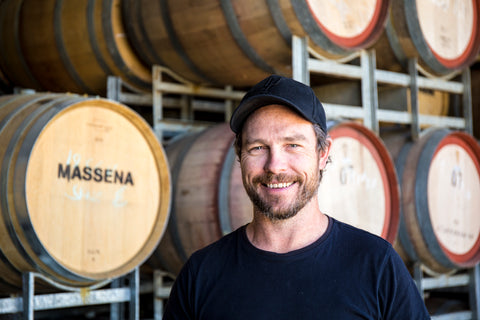
Meet Jaysen Collins, Massena's owner and winemaker
Ahead of December's One Wine delivery, we took some time to speak with Jaysen Collins, who you can thank for making your 2018 Stonegarden GMS.
Talk to us about Massena – how long have you been making wines for?
"We started back in 2000. Dan [Standish] and I essentially decided to buy a few grapes with our credit cards. It was more about having a hobby and learning to make wine, since we weren't trained winemakers or anything. We bought maybe two tonnes of grapes and jumped in to make a blend of grenache, mataro, shiraz and cinsault. Again, it was just meant to be educational and a bit of an adventure, but the US was a big market for the Barossa back then and an importer tried our wine and decided to buy the whole lot. We kept going after that and now it's been 20 or so vintages, but the philosophy behind Massena has always been to just have a go and see what happens."
We're featuring the '18 Stonegarden GMS as our December wine. What was the 2018 vintage like?
"It was the last vintage we had before a couple of drought years. A really well-balanced vintage, which is great for the vineyard as the vines just produce what they want to produce. There weren't too many hot days and we had a really wet 2017, so there was plenty of residual moisture in the soil. There was no stress on the vines and I think we'll find that 2018 will be one of the most highly rated vintages in recent times."
Can you tell us about the Stonegarden vineyard?
"The vines were planted in the 1850s and it's owned by a guy called Glen Monaghan. He considers himself something of a custodian, since the vineyard has been passed through so many generations, and he's done all the right stuff with the soil. Geographically speaking, it's an Eden Valley vineyard, but it's really quite far east, so it's almost the last vineyard before you hit the hills. This means that it's at a higher altitude than the rest of the Barossa, and the soils aren't as alluvial either. Stonegarden has quite rocky, granitic and lean soils, which provide a really good natural acidity to the wine. A lot of the time, grenache from the Barossa will have a higher pH level and be missing that real zing, whereas the Stonegarden really retains its acidity for reds, which is fantastic from a winemaking point of view."

An aerial view of the Stonegarden Vineyard
Talk to us about the wine – what do we need to know?
"With the best vineyards, like Stonegarden, you've really just got to leave the wine alone as much as you can, so I try not to manipulate it too much. It's actually a pretty rare wine as there's not much 160-year-old fruit lying around the Barossa. People line up to get their hands on grapes from Stonegarden, and this wine comes from a section of the vineyard we identified as having a higher proportion of mataro and shiraz interplanted. A lot of the time, GSM is made from different vineyards that have been harvested at different times and blended together, but this is actually a field blend. It means we can't control the percentage year to year, but that's what makes this such an interesting wine.
There's also a really good acid balance and I like using a decent amount of the grenache stalks. I wanted the stalks to be in contact with the juice, so the wine is more about structure than those primary fruit flavours. If you've got good acid, and you can pull a good structure of the stalks and skins, then you've got a wine that's going to age beautifully, like this one. I don't put any fining agents in, and it doesn't go through a filter at all; I just put it in barrels for a couple of years then it goes into a tank and a bottle.
I think this really is like drinking a bit of history. It's also pretty unadulterated and as pure as the Barossa gets. It could also be considered a natural wine as there's nothing added at all, aside from a little bit of sulphur. For me, it's winemaking as best as you can get it."

The grapes for the '18 Stonegarden GMS being crushed the traditional way.
What about food? Will this have a place at the Collins' Christmas table?
"Given that it's summer, I'd be drinking this with salumi in the late afternoon. Anything with a bit of meaty fattiness to it really, though in the winter, I'd be jumping on something slow-cooked instead. If we're talking Christmas, I've got a really nice wood grill, so we'll be charring a few chickens over that and getting both sides of the family to bring a plate with them. This wine will go down a treat with a roast chicken and a bit of gravy, and if it's going to be a hot day, there's no issue taking the temperature down a little. I wouldn't properly chill it, but I'd chuck it on ice to take some of the heat out."
